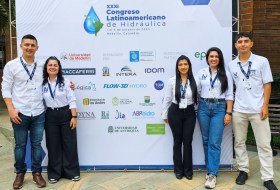News
Unicaucan researchers present their proposals at the Latin American Hydraulic Congress.
Professors and students from the Faculty of Civil Engineering at our Alma Mater participated with two presentations and a poster during the XXXI Latin American Hydraulic Congress, which took place from October 1 to 4 at the University of Medellín.
Representing the Research Group in Hydraulics and Hydrology and the HydroInnovation Research Seedbed, affiliated with the Department of Hydraulics in the Faculty of Civil Engineering at the University of Cauca, professors Felipe Agredo, Andrea Bolaños, and María Jimena Paredes, along with students Dayanna Jiménez, Mildred Pantoja, Daniela Ortiz, and Kevin Rengifo, participated in the XXXI Latin American Hydraulic Congress of the IAHR (International Association for Hydro-Environment Engineering and Research) and IAHR Ibero-America.
During the event, held from October 1 to 4 at the University of Medellín, the group presented two oral presentations and a poster that received excellent reviews from doctors in hydraulics and hydrology from across Latin America, generating valuable discussions about future work and potential collaborations. Their contributions, particularly in benefit of the Cauca department, were highlighted, including the development of regional models for estimating maximum flow rates, methodologies for reconstructing flow data, and the implementation of a quick and free consultation website with processed rainfall information—a useful tool for both consulting and research.

Provided photo
Additionally, the Unicaucana delegation was supported by Professor María Jimena Paredes, who accompanied and backed the presenters and students throughout the event, contributing to the group's successful participation. Alongside their presentations, the University of Cauca delegation attended conferences and keynote talks by international experts, allowing them to gain firsthand knowledge of the latest advancements and global trends in hydraulics.
‘By sharing space with great masters and doctors in the water sector, one becomes aware that the more you learn, the more you discover how much remains to be researched. This experience motivates us to continue working and building science from our beloved department of Cauca and our University of Cauca,’ stated Professor Felipe Agredo.

Provided photo
Considering the excellent outcome, the Research Group in Hydraulics and Hydrology is already preparing new projects and research aimed at participating in the 41st World Hydraulic Congress of the IAHR, which will take place next year in Singapore.
In the context of events like this, the importance of continuing to strengthen research and collaboration among universities and experts from the region and around the world becomes evident. The reflections that took place during this congress not only enrich knowledge but also underline our Alma Mater's commitment to developing innovative solutions that positively impact not just Cauca, but also transcend local and regional borders.
This type of space not only celebrates knowledge but also reminds us of the constant need to learn, improve, and share knowledge to tackle the challenges of the present and future—something that is undoubtedly a fundamental part of the Unicaucano DNA.
Want a bit more detail about this participation? Here are the titles of the presentations and the poster:
'Estimation of Maximum Flow Rates Based on Morphometry of Watersheds in the Department of Cauca, Colombia,' by Professor Agredo.
'Methodology for Constructing Maximum Flow Rates in Mountain Watersheds: River Piedras Watershed (Cauca, Colombia),' by Professor Bolaños.
'Update of IDF Curves for the Department of Cauca in a Web Visualization Tool,' a poster presented by student Dayanna Jiménez with support from Professor Agredo.
Written by: Communications Management Center.


